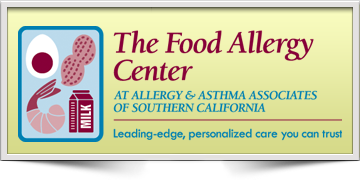What is a food allergy?
Your body can develop allergies to many different things. When your immune system makes the allergic antibody, (Immunoglobulin E or IgE) to a food that you have developed food allergy. These types of allergies are move common in children but some may persist for life. Furthermore, you may develop a new allergy at any age. Food allergies are most common in those children that have other allergies, such as allergic rhinitis (hay fever), and eczema (dry, itchy, red skin rash). Once food allergies have developed it is very important to avoid these foods, as severe allergic reactions may take place which may be life threatening. In fact, once the allergy is establish, only a very tiny amount is required to trigger the allergic reaction. These reactions can be very sudden and require immediate treatment to potentially prevent death.
How did this happen?
It is unclear why allergies develop, there are many theories but the truth is we still don't understand why people develop allergies. A food allergy or any allergy for that matter is when the body's immune system reacts to a harmless substance (a food). Many people feel that allergies represent a suppressed immune system when in fact it is an over active immune response. When your immune system responds it produces an antibody or immunoglobulin. These are typically used by the immune system to fight infection. In the setting of allergies, the immune system produces the allergic antibody called IgE or immunoglobulin E. In the normal immune response this antibody fights parasites. With allergies, IgE results in the symptoms of allergy. Now that your body has the allergic antibody, the next time you each that particular food, your immune system releases huge amounts of chemicals, like histamine, tryptase, and others, that would normally protect the body against a parasitic infection. When released these chemical trigger the symptoms of allergy. In allergic rhinitis or hay fever this results in sneezing, runny nose and nasal congestion. In food allergy, these chemicals are released in massive amounts and can affect the respiratory and cardiovascular systems, gastrointestinal tract, and skin. It can be so severe that these vital organs stop working normally and can lead to sudden death in the severely allergic.
What are the most common triggers for food allergy?
Many different foods can cause an allergic reaction. The foods that most often cause a reaction are:
- Cow's milkEggsPeanutsTree nutsSeafood, especially shellfishWheatSoy
People who have asthma, especially when it is not adequately controlled, have an increased risk of a severe or fatal reaction.
What are the symptoms of food allergy?
Different people may react differently, and a single person may not have the same reaction twice. In other words, there is no way to tell how severe a food allergy reaction may become so prompt treatment is always recommended. In some patients the reaction may occur immediately after contact with food, in others it may be delayed for several hours. Symptoms may be mild with only a rash, or they might be life threatening when the allergy causes breathing problems or heart problems.Symptoms may include:
- Wheezing or trouble breathingSkin rash or hivesItching all overSwelling in the lips, face, throat, or other part of the bodyVomitingDiarrheaStomach crampsCoughingChange of voiceTrouble swallowingThroat tightness or closingRed, watery eyesDizzinessFaintingSense of doom
How do I know if I have food allergy?
If you are concerned for food allergy or if you have had a severe allergic reaction you should see an allergist to be tested for food allergies. Your visit with will usually involve a detailed history of foods that you may have eaten, a determination of how severe the symptoms were and a detailed physical exam. Your doctor will pay special attention to the presence of other allergic diseases like allergic rhinitis (hay fever), asthma and eczema. You should strictly avoid foods that you think you are allergic to until you have had a full evaluation by your doctor. When the history and tests are not entirely clear your doctor may recommend that you keep a food diary. This involves recording all of the food you eat and when you eat it. You should also record any symptoms you may have. If your doctor feels that your symptoms are consistent with food allergy then allergy skin tests for common food allergies such as egg, cow's milk, nuts, and shellfish will be performed. Usually from the history the most obvious culprit can be identified and testing to that food will be performed. It is not advised to have random food allergy testing to a whole battery of foods when there are no clear symptoms. The concern is that a result may be a false reading and you will unnecessarily avoid foods.
How is it treated?
Most importantly there is no cure for food allergies. Strict avoidance of foods you are allergic to is the only way to prevent a reaction. Over time, with certain foods and strict avoidance, the allergy may wane. This usually occurs in children who have mild food allergy reactions. Certain food allergies, such as nuts, never go away and will have to be avoided for life. If you have accidental exposure and symptoms develop you should not wait for symptoms to become severe prior to treatment. Your doctor should prescribe a shot of epinephrine that you can give to yourself then call 911 for emergency help. Your doctor may also recommend antihistamines or steroid medications that you use for a short time. However, it is important that you use these medications for additive therapy as use the epinephrine as the first line treatment. Antihistamine and steroids only treat the symptoms while the epinephrine will treat the allergic reaction. The effects of the allergic reaction last from several minutes to hours, depending on how much of the food you ate and the severity of your allergy. In 25% of patients a second injection of epinephrine is required so it is important that you call 911 or go to the emergency room.
What can I do to prevent accidental exposure?
The only way to prevent accidental exposure is strict food avoidance especially when eating out of your house, at a friend's house, or at school. It is very important that you learn how to read food labels and ask about ingredients in foods that you have not prepared (schools, daycare, & restaurants). In addition to having the epinephrine shot available you should wear a medical ID bracelet or necklace that informs others your allergy.








